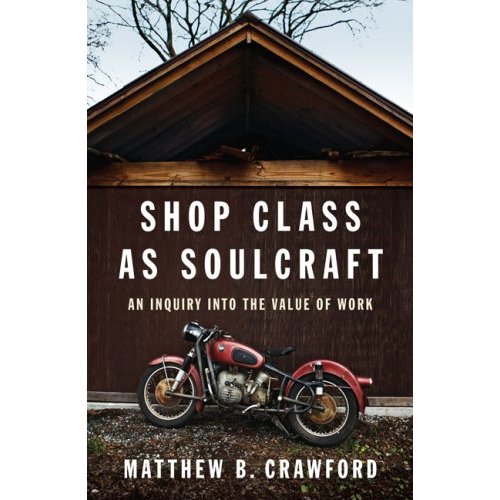Book Review: "Shop Class as Soulcraft" by Matthew Crawford
Matthew Crawford is a practicing motorcycle mechanic out of Richmond,Virginia. He’s also an excellent writer who holds a philosophy degree from the prestigious University of Chicago. This unusual trifecta informs “Shop Class as Soulcraft: an Inquiry Into the Value of Work.” Anyone who’s changed their oil or timed a distributor (remember them?) will appreciate the result.
Disregard the slightly woo-woo title. This is no Zen and the Art of the Motorcycle, which was a prissy piece of pretentious, barely readable hokum. [One reviewer damned my book The Gold-Plated Porsche with faint praise by asserting that it was better than Zen and the Art . . .”] Crawford’s book is a querulous examination of how and why we’ve given up our appreciation for the skills of the craftsperson—-or even the simple integrity of the committed do-it-yourselfer. In the process, we’ve become a culture of “change ‘er out, not worth troubleshootin’ it” techs.
Crawford traces the shift to our collective belief in the mantra “Time Is Money.” As a consequence, some of our ’57 Chevys and ’71 240Zs are worth more than a used F430—if you multiply hours times the going hourly day-job rate of some of the enthusiasts who lovingly restore and maintain them. There are other ramifications . . .
My daughter recently became a San Francisco homeowner. She asked me if she should buy an extended warranty on her new washer and dryer. After explaining the transaction’s super-scam aspect, I told her that the appliances are in fact incredibly simple machines. They can be stripped naked by the removal of a few sheetmetal screws, exposing a motor, belt and drum (or a motor, pump and hoses). She could rectify most problem using internet how-to sites plus the substantial toolkit I had assembled for her Manhattan-apartment days.
Crawford would approve. More to the point, he’d agree that the mini-education thus attained would stand my daughter in good stead. Both practically and philosophically.
Crawford charts the changes that I’ve seen first hand. Back in the 1950s, a mechanical education was a standard part of the average high school curriculum. As a child of the FDR era, I “took shop.” To this day, I remember the specific differences between crosscut and rip saws (Lesson One, I believe).
Sometime around 1990, American educators decided we’d moved beyond such skills, into the Information Age. High schools across the land dumped their industrial-quality lathes, drill presses, bandsaws and welding rigs onto the used market. (You can still find them on eBay.) And if a student were “retarded” enough to need shop class, he could always go to the local BOCES and become a butt-crack plumber.
The sea change created a vast sea of cubicle Dilberts—people doing things they neither care about nor understand. They follow simple patterns to accomplish their jobs. Crawford points out that the transition started long before shop class went the way of the hula hoop.
According to popular mythology, Henry Ford paid his workers twice as much as they’d otherwise have earned to make them affluent enough to buy Model Ts. In fact, when Ford developed the assembly line—each worker turning one bolt or fastening one bracket all day long—his former bicycle and carriage craftsmen quit in droves. Overpaying them was the only way Ford could secure enough workers willing to withstand the endless, mindless, repetitive, monotony. The creation of the middle class, and their accession to Model T ownership, was an unintended consequence.
Fast forward to 1969. If you’d taken your Porsche to the dealer with an infuriating cold-start problem, a mechanic who’d made a camshaft from a steel billet with a hand file to satisfy his apprenticeship would have quickly sorted it out. And now? Your Porsche is serviced by a “technician” who relies on the computerized OBD fault code that he (or she) finds on a list.
As Crawford correctly points out, the Porsche “specialist” is reasonably effective, but he lacks a deep understanding of the machine under his care. He’s like the Information Age student who has learned how to find a square root on their calculator—but doesn’t know what a square root signifies. A single botched keystroke can turn the root of 36 into 18 rather than six, and they won’t have the knowledge or experience to say, “No, that can’t be right.” In the same way, the Porsche tech may not tumble to the fact that if the sparkplugs are carbon black, maybe the engine is running rich—-even though the fault code “insists” on lean.
If you skip some of Crawford’s heady philosophy, “Shop Class as Soulcraft” reassures mechanically adept readers that working on your car imports treasure beyond measure. Still, as the old Zen says, the map is not territory.
I'm the automotive editor of Conde Nast Traveler and a freelancer for a variety of other magazines as well. Go to amazon.com and read more about me than you ever wanted to know if you do a search for either of my current books, "The Gold-Plated Porsche" and "Man and Machine." Been a pilot since 1967 (single- and multi-engine land, single-engine sea, glider, instrument, Cessna Citation 500 type rating all on a commercial license) and I use the gold-plated Porsche, a much-modified and -lightened '83 911SC, as a track car.
More by Stephan Wilkinson
Latest Car Reviews
Read moreLatest Product Reviews
Read moreRecent Comments
- Analoggrotto What the heck are those people doing in front of that house? Just staring at this stupid pos truck?
- Jeff Good review but the XLT although not a luxury interior is still a nice place to be. The seats are comfortable and there is plenty of headroom. The main downside is the limited availability resulting in dealer markups above MSRP. I have a 2022 hybrid Maverick XLT for over 2 years and it has more than met my expectations. I believe for many who do not need a truck most of the time but want one the Maverick will meet their needs.
- Kwik_Shift_Pro4X I use a now discontinued Kuhmo AT tire that is surprisingly good in the snow, even in 2WD. However since most of my driving is on road, I'm going to look for a more highway friendly tire for smoother quiet. I'm sure it can still handle the forest roads leading to my fishing spots.
- MaintenanceCosts So this is really just a restyled VW Fox. Craptacular tin can but fun to drive in a "makes ordinary traffic seem like a NASCAR race" kind of way.
- THX1136 While reading the article a thought crossed my mind. Does Mexico have a fairly good charging infrastructure in place? Knowing that it is a bit poorer economy than the US relatively speaking, that thought along with who's buying came to mind.

































Comments
Join the conversation
Spent the past several months taking car of a machine shop at a university after the original machinist retired. Have come to believe that kids don't know didly about shop skills b/c too many have zero opportunity to learn them. Talking to these kids it has become clear to me that a number of them came from houses where there were no tools or skills to use tools. Perhaps feeling successful for the average suburbanite parent is the ability to hire out many of life's chores??? Many of these kids are eager to learn how to weld or machine given the chance a little guidance. Yes, there are still kids out there whose priorities revolve around gadgets and TV who don't know anything and don't want to know anything except how to kill the monster in their favorite video game.
Great book, I'm just finishing it up now. An interesting and thought proviking read. Be warned, it's written with an advanced vocabulary, which I enjoyed because it's been a while since I had such a challenging book. Any word I had to look up I wrote the definition in the back, I think dichotomy was the first entry. Anyway this book sheds some light on how our society works, and also gave me some insight on why I do things the way I do (Yes I fix everything myself and have a V4 Honda). Because Crawford draws so heavily on his own unsatisfactory experiences in the cubicle world he misses part of the picture. Just as the skilled trades offer learning opportunites and challenges beyond the assembly line so too is there interesting, varied and creative work to be had behind a desk. Engineering, industrial design, programming, animation and other graphic arts offer a similar experience at desk or cubicle.